
Branding and marketing are vital components of any business, including professional services. Whether you’re a lawyer, accountant, consultant, or any other type of professional service provider, establishing a solid brand and effective marketing strategies can help you stand out in a competitive market. However, there are certain dos and don’ts to keep in mind to ensure your efforts yield the best results. In this article, we’ll explore the fundamental principles of successful branding and marketing for professional services.
Do: Define Your Unique Value Proposition
Before diving into branding and marketing, it’s essential to define your unique value proposition (UVP) clearly. What sets you apart from your competitors? What specific skills, expertise, or approach do you bring to the table that others don’t? Understanding your UVP is crucial, as it forms the foundation of your branding efforts.
Your UVP should answer the question, “Why should clients choose you?” Once you have a clear and compelling UVP, it becomes the core message of your branding and marketing materials.
Don’t: Neglect Consistency in Branding
Consistency is vital when it comes to branding. Your brand identity, including your logo, colors, fonts, and messaging, should remain consistent across all your marketing materials. This consistency helps create a cohesive and memorable brand that clients can easily recognize and trust.
Inconsistencies in branding can make your professional image clear for potential clients and weaken your professional image. Make sure all your online and offline touchpoints, from your website and social media profiles to business cards and brochures, reflect a unified brand identity.
Do: Invest in a Professional Website
In today’s digital age, a professional website is a non-negotiable element of your marketing strategy. Your website serves as your online storefront and often serves as the first impression potential clients have of your services. Ensure your website is well-designed, user-friendly, and mobile-responsive.
Additionally, your website should provide valuable content that showcases your expertise and helps potential clients understand your services. Regularly update your site with informative blog posts, case studies, and client testimonials to demonstrate your knowledge and credibility.
Don’t: Overlook Search Engine Optimization (SEO)
Having a great website is not enough if it doesn’t appear in search engine results. Search engine optimization (SEO) is the process of optimizing your website to rank higher in search engine listings. It’s a crucial component of online marketing for professional services.
Research relevant keywords and phrases that potential clients may use when searching for your services and incorporate them naturally into your website’s content. This will improve your chances of appearing in search results and driving organic traffic to your site.
Do: Build a Strong Online Presence
In addition to your website, a solid online presence includes active engagement on social media platforms and maintaining profiles on professional networking sites like LinkedIn. These platforms offer opportunities to connect with potential clients, share your expertise, and build your professional network.
Regularly update your social media profiles with valuable content, engage with your audience, and participate in relevant industry discussions. Consistency in your online presence will help establish your credibility and foster trust with your target audience.
Don’t Ignore the Power of Content Marketing
Content marketing is a highly effective strategy for professional service providers. By creating and sharing valuable content, such as articles, whitepapers, videos, and webinars, you can demonstrate your expertise and build trust with your audience.
Invest time in developing a content marketing plan that aligns with your target audience’s interests and pain points. Consistently producing high-quality content not only educates your audience but also helps establish you as a thought leader in your field.
Do: Cultivate Client Relationships
Effective branding and marketing are not solely about attracting new clients; they’re also about retaining existing ones. Building strong client relationships is essential for repeat business and referrals.
Stay in touch with your clients through regular communication, provide exceptional service, and seek feedback to improve your services continuously. Satisfied clients can become your best brand advocates, recommending your services to others.
Don’t Neglect Analytics and Measurement
It’s crucial to track the performance of your branding and marketing efforts. Use analytics tools to monitor website traffic, social media engagement, email campaign results, and more. By analyzing this data, you can identify what’s working and what needs improvement.
Regularly review your metrics and adjust your strategies accordingly. This iterative approach allows you to optimize your marketing efforts for better results over time.
Effective branding and marketing for professional services involve:
- Defining your unique value proposition.
- Maintaining consistency in branding.
- Investing in a professional website.
- Leveraging online presence and content marketing.
Avoid common pitfalls like neglecting SEO, overlooking client relationships, and failing to measure your efforts. By following these dos and don’ts, you can establish a strong brand and attract and retain clients in a competitive professional services landscape.